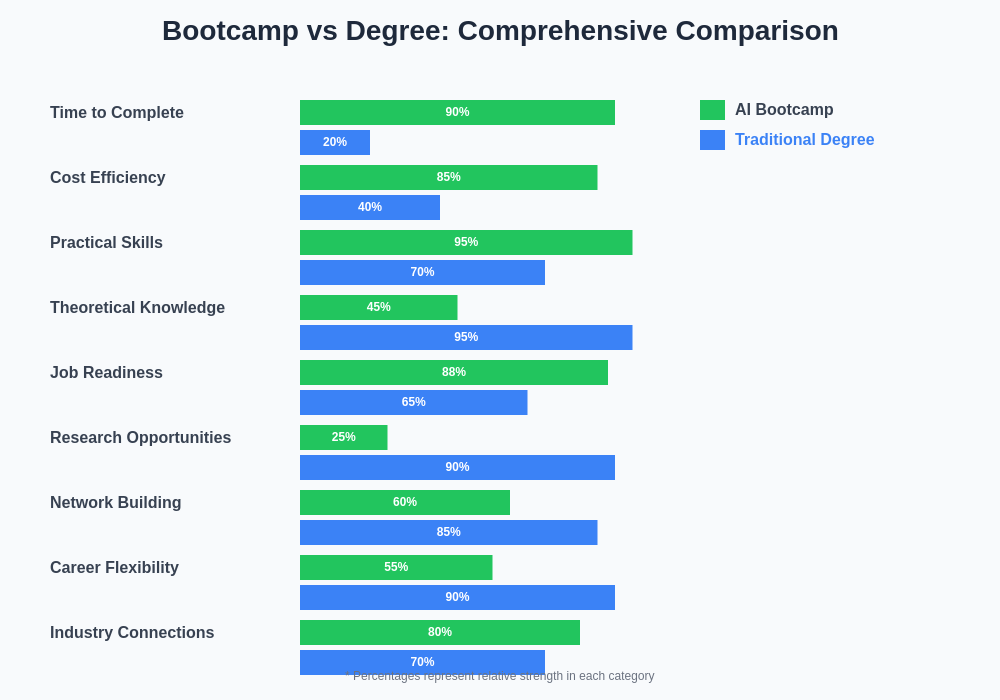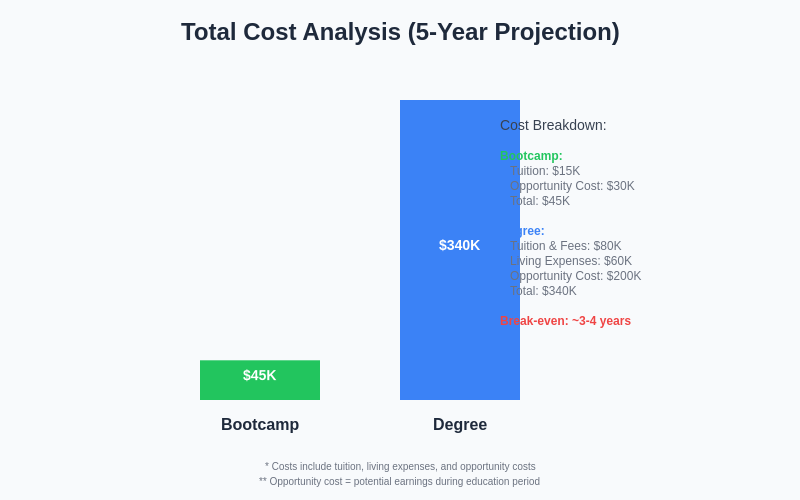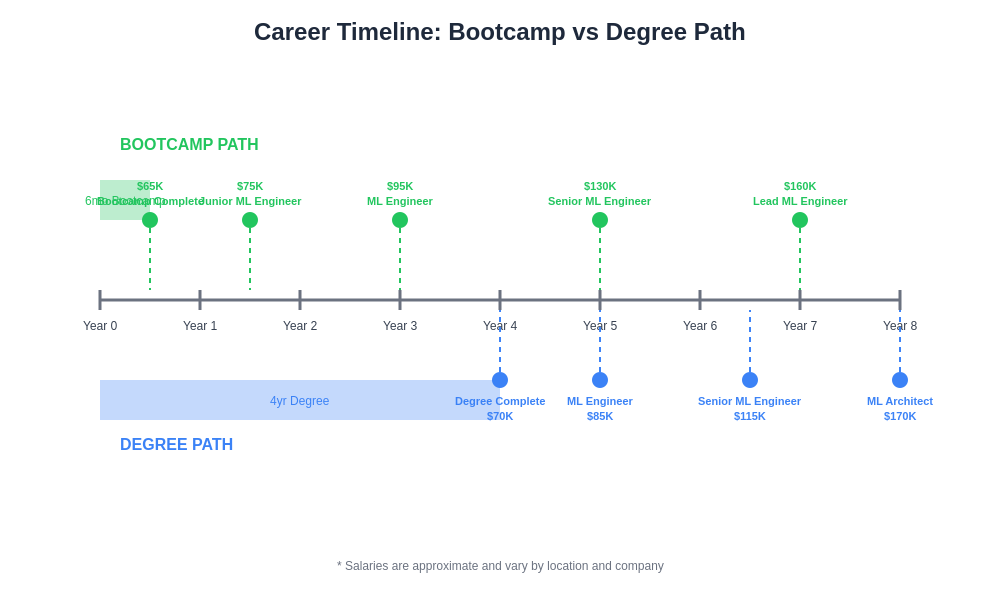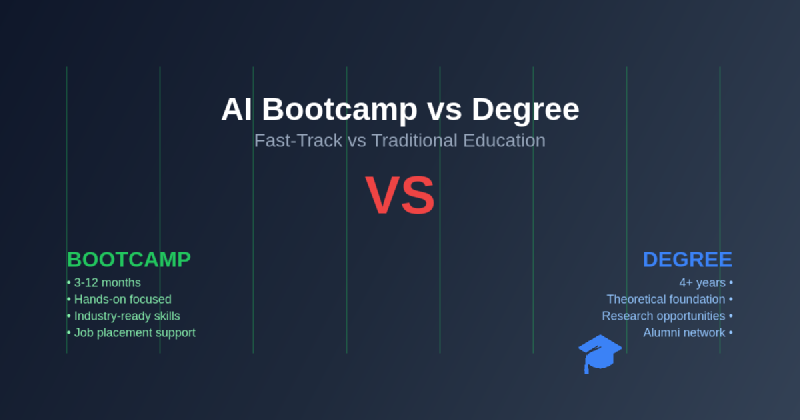The artificial intelligence revolution has created unprecedented demand for skilled professionals, leading to a fundamental question that countless aspiring technologists face: should they pursue an intensive AI bootcamp or invest in a traditional computer science degree? This decision represents more than just an educational choice; it embodies a strategic career decision that will influence earning potential, job opportunities, skill development, and long-term professional trajectory in one of the most dynamic and rapidly evolving fields in technology.
The emergence of AI bootcamps has disrupted conventional educational pathways, offering accelerated learning experiences that promise to transform complete beginners into job-ready AI practitioners in months rather than years. Meanwhile, traditional degree programs continue to provide comprehensive theoretical foundations and broad-based knowledge that many employers still value highly. Understanding the nuances of each approach is crucial for making an informed decision that aligns with individual circumstances, career goals, and learning preferences.
Stay updated with the latest AI educational trends to understand how the landscape of AI education continues to evolve and influence career opportunities in this rapidly advancing field.
The Rise of AI Bootcamps
AI bootcamps have emerged as a direct response to the skills gap in the artificial intelligence industry, where traditional educational institutions struggled to keep pace with rapidly evolving technologies and industry demands. These intensive programs typically range from three to twelve months and focus exclusively on practical, hands-on learning experiences designed to prepare students for immediate entry into the workforce. The bootcamp model represents a fundamental shift from theoretical academic learning toward project-based, industry-relevant skill development that emphasizes real-world application over academic research.
The appeal of AI bootcamps lies in their promise of rapid skill acquisition and direct pathways to employment, often featuring partnerships with technology companies, mentorship from industry professionals, and career placement services that connect graduates with potential employers. These programs typically cover essential topics including machine learning algorithms, deep learning frameworks, data preprocessing, model deployment, and practical programming skills using popular tools and libraries such as Python, TensorFlow, PyTorch, and cloud computing platforms.
The bootcamp approach emphasizes learning by doing, with students working on real projects, building portfolios, and developing the practical skills that employers immediately need. This hands-on methodology appeals to career changers, professionals seeking to upskill, and individuals who prefer intensive, focused learning experiences over extended academic programs. The compressed timeline and practical focus make bootcamps particularly attractive for those who need to enter the job market quickly or cannot commit to multi-year educational programs.

This comprehensive analysis reveals the distinct strengths of each educational approach across multiple dimensions. While bootcamps excel in practical skills development and job readiness, traditional degrees provide superior theoretical foundations and research opportunities. The choice between these paths depends heavily on individual circumstances, career goals, and learning preferences.
Traditional Degree Programs: The Academic Foundation
Traditional computer science and related degree programs offer a comprehensive educational experience that extends far beyond technical skills to include theoretical foundations, mathematical rigor, research methodologies, and broad-based knowledge across multiple domains of computer science and related fields. These programs typically require four years for undergraduate degrees and additional years for advanced degrees, providing extensive time for deep learning, intellectual development, and exploration of diverse specialization areas.
University degree programs emphasize theoretical understanding of computational principles, mathematical foundations of machine learning, algorithm design and analysis, and comprehensive coverage of computer science fundamentals including data structures, software engineering, computer systems, and database management. This broad foundation enables graduates to understand not just how to implement AI solutions, but why certain approaches work, how to innovate beyond existing methods, and how to adapt to technological changes throughout their careers.
The academic environment also provides opportunities for research participation, academic publication, internships with major technology companies, networking with peers and faculty, and exposure to cutting-edge research that may not yet be available in industry settings. Many degree programs offer specialized tracks in artificial intelligence, machine learning, or data science, allowing students to focus their studies while maintaining the broad foundation that universities are uniquely positioned to provide.
Experience advanced AI learning with Claude for personalized tutoring and comprehensive explanations of complex AI concepts that complement formal education programs.
Time Investment and Learning Pace
The most immediately apparent difference between AI bootcamps and degree programs lies in their dramatically different time requirements and learning pace expectations. Bootcamps typically require full-time commitment for three to twelve months, with many programs featuring intensive daily schedules that may include eight or more hours of instruction, hands-on practice, and project work. This compressed timeline demands exceptional focus, dedication, and the ability to absorb large amounts of technical information rapidly while simultaneously applying new concepts to practical projects.
The accelerated pace of bootcamp learning can be both advantageous and challenging, depending on individual learning styles, prior experience, and personal circumstances. Students who thrive in high-intensity environments and prefer immersive learning experiences may find the bootcamp pace invigorating and effective, while others may struggle with the rapid progression and lack of time for deep reflection and understanding of complex concepts.
Traditional degree programs operate on a fundamentally different timeline, typically requiring four years for undergraduate degrees and additional time for advanced degrees. This extended timeframe allows for gradual skill development, deeper exploration of theoretical concepts, multiple opportunities to apply knowledge across different contexts, and time for intellectual maturation. The semester-based structure provides natural breaks for reflection, internships, research projects, and the development of a comprehensive understanding that extends beyond immediate job requirements.
Cost Analysis and Financial Considerations
The financial implications of choosing between AI bootcamps and traditional degrees represent a complex calculation that extends far beyond simple tuition costs to include opportunity costs, potential earnings, student loan obligations, and long-term career financial outcomes. Bootcamp tuition typically ranges from ten thousand to thirty thousand dollars, representing a significant but manageable investment for many individuals, especially when compared to the total cost of a four-year degree program.
Traditional degree programs involve substantially higher total costs when considering tuition, fees, housing, books, and other educational expenses over four or more years. State university costs for in-state residents may be relatively modest, while private universities and out-of-state public institutions can result in total educational investments exceeding one hundred thousand dollars. These costs often require student loans that may take decades to repay and influence career decisions long after graduation.
However, the financial analysis must also consider opportunity costs and potential earnings differences. Bootcamp graduates enter the workforce years earlier than degree program students, potentially earning salaries and gaining professional experience while their peers are still in school. This head start can result in significant cumulative career earnings advantages, particularly in high-demand fields like artificial intelligence where salaries can be substantial even for entry-level positions.
The return on investment calculation becomes more complex when considering long-term earning potential, career advancement opportunities, and the different career trajectories typically available to bootcamp graduates versus degree holders. While bootcamp graduates may enter the workforce sooner, degree holders may have access to higher-level positions, research opportunities, and leadership roles that could result in greater long-term financial rewards.

The financial analysis demonstrates significant cost differences between educational pathways, with bootcamps requiring substantially lower upfront investment but degree programs potentially offering greater long-term earning potential. The break-even point typically occurs within three to four years, making the decision highly dependent on individual financial circumstances and career timeline preferences.
Curriculum Depth and Breadth Comparison
The curricular approaches of AI bootcamps and degree programs reflect fundamentally different educational philosophies and career preparation strategies. Bootcamps typically focus intensively on the most immediately practical and industry-relevant skills, emphasizing hands-on experience with current tools, frameworks, and methodologies that employers actively seek. This targeted approach ensures that graduates possess demonstrable competencies in high-demand areas such as machine learning model development, data preprocessing, cloud deployment, and popular programming frameworks.
Bootcamp curricula are designed in close consultation with industry partners and are frequently updated to reflect changing technology trends and employer requirements. This responsiveness to industry needs means that bootcamp graduates often possess cutting-edge skills in the most current technologies and approaches, making them immediately valuable to employers seeking specific technical competencies. The practical focus means that much of the learning time is devoted to building real projects, developing portfolios, and gaining experience with industry-standard development practices.
Traditional degree programs offer significantly broader and deeper coverage of foundational concepts, mathematical principles, theoretical frameworks, and diverse areas of computer science and related fields. Students study discrete mathematics, statistics, calculus, linear algebra, algorithms, data structures, software engineering, computer systems, databases, networks, security, and numerous other topics that provide comprehensive understanding of computing principles and their applications.
This broad foundation enables degree holders to understand the underlying principles that govern artificial intelligence systems, adapt to new technologies and methodologies as they emerge, contribute to research and development efforts, and approach complex problems with theoretical understanding that extends beyond specific tools or frameworks. The depth of mathematical and theoretical preparation also enables degree holders to pursue advanced specializations, research opportunities, and leadership positions that may require comprehensive understanding of computational principles.
Industry Perspectives and Employer Preferences
The technology industry’s perspective on AI bootcamp graduates versus degree holders reflects the complex and evolving nature of hiring practices in a field where practical skills, theoretical knowledge, and cultural fit all contribute to hiring decisions. Many technology companies have embraced skills-based hiring practices that prioritize demonstrated competencies over educational credentials, creating opportunities for bootcamp graduates who can effectively demonstrate their abilities through portfolios, technical interviews, and practical assessments.
Large technology companies including Google, Apple, Microsoft, and others have publicly stated that they no longer require college degrees for many technical positions, instead focusing on candidates’ ability to perform job-relevant tasks regardless of their educational background. This shift has created significant opportunities for bootcamp graduates and self-taught developers who can demonstrate competency through their work and technical skills rather than formal credentials.
However, many employers still value the comprehensive education, problem-solving abilities, and theoretical understanding that degree programs provide, particularly for roles that involve research, system architecture, technical leadership, or complex problem-solving that extends beyond implementing existing solutions. Academic credentials may be particularly important for positions in research organizations, government agencies, academic institutions, or companies that have established educational requirements for certain roles.
Enhance your AI research capabilities with Perplexity to access comprehensive information and stay current with rapidly evolving industry trends and employer expectations.
The hiring landscape also varies significantly across different types of companies, with startups and smaller technology companies often being more flexible about educational requirements while larger, more established organizations may have more formal credential expectations. Government positions, academic roles, and certain consulting opportunities may specifically require degree qualifications, while many technology startups and innovative companies prioritize skills and performance over formal education.
Career Advancement and Long-Term Prospects
The long-term career implications of choosing between bootcamp and degree paths extend far beyond initial job placement to encompass advancement opportunities, earning potential, career flexibility, and professional development throughout an individual’s working life. Bootcamp graduates often enter the workforce in junior to mid-level individual contributor roles where they can immediately apply their practical skills and begin gaining professional experience in real-world environments.
The career advancement path for bootcamp graduates typically emphasizes skill development, project leadership, and specialization in particular technologies or industry domains. Many successful bootcamp graduates advance into senior technical roles, team leadership positions, or specialized consulting opportunities by continuously updating their skills, building strong professional networks, and demonstrating exceptional performance in their roles.
Traditional degree holders may have access to a broader range of career opportunities from the outset, including research positions, technical leadership roles, product management opportunities, and paths toward executive leadership that may be more readily available to those with comprehensive educational backgrounds. The theoretical foundation and broad knowledge base provided by degree programs can facilitate career pivots, enable contributions to strategic decision-making, and support advancement into roles that require understanding of business strategy, technology trends, and complex system design.
The rapidly evolving nature of artificial intelligence technology means that continuous learning and skill development are essential regardless of initial educational background. Bootcamp graduates may need to invest more heavily in ongoing education to develop theoretical understanding and stay current with advancing research, while degree holders may need to continuously update their practical skills to remain relevant in a field where specific technologies and frameworks evolve rapidly.

The career progression timelines illustrate how different educational paths impact professional development over time. Bootcamp graduates typically achieve faster initial entry into the workforce and earlier earning potential, while degree holders may experience slower initial progress but potentially higher long-term career trajectories and leadership opportunities.
Skills Development and Learning Outcomes
The skills development outcomes from AI bootcamps and degree programs reflect their different educational approaches and time investments, resulting in graduates with complementary but distinct competency profiles. Bootcamp graduates typically develop strong practical skills in specific areas such as machine learning implementation, data preprocessing, model deployment, and proficiency with industry-standard tools and frameworks that enable immediate productivity in professional environments.
The hands-on learning approach of bootcamps ensures that graduates have extensive experience building real projects, working with actual datasets, implementing machine learning algorithms, and deploying models in production environments. This practical experience translates directly to job performance and enables bootcamp graduates to contribute meaningfully to projects from their first day of employment.
Degree program graduates develop comprehensive theoretical understanding of computational principles, mathematical foundations of machine learning, algorithm design and analysis, and broad knowledge across multiple areas of computer science that provide flexibility and adaptability throughout their careers. This foundation enables degree holders to understand not just how to implement existing solutions, but why certain approaches work, how to innovate beyond current methods, and how to adapt to technological changes.
The mathematical rigor of degree programs typically includes extensive study of statistics, linear algebra, calculus, discrete mathematics, and probability theory that underlying artificial intelligence and machine learning algorithms. This mathematical foundation enables degree holders to understand research literature, contribute to algorithm development, optimize system performance, and adapt to new methodologies as the field continues to evolve.
Networking and Professional Connections
The networking opportunities and professional connections available through different educational paths can significantly influence career development, job opportunities, and long-term professional success in the artificial intelligence field. Traditional degree programs provide extensive networking opportunities through classmates, faculty relationships, alumni networks, research collaborations, internship programs, and university-sponsored industry connections that can provide valuable career support throughout an individual’s professional life.
University alumni networks often include professionals across diverse industries, seniority levels, and geographic locations who can provide mentorship, job referrals, collaboration opportunities, and career guidance. The extended time spent in degree programs allows for deeper relationship development with peers and faculty members, creating stronger professional bonds that may provide ongoing career benefits.
Bootcamp programs often emphasize industry connections through partnerships with technology companies, mentorship programs with working professionals, and career placement services that directly connect graduates with potential employers. The intensive nature of bootcamp experiences can create strong bonds among cohort members who share the challenging experience of accelerated learning and career transition.
Many bootcamp programs feature guest speakers from industry, networking events with potential employers, and career services that actively facilitate job placement and professional connections. The focus on immediate job placement means that bootcamp networking efforts are typically more concentrated on short-term employment opportunities rather than long-term professional relationship building.
Specialization Opportunities and Career Paths
The specialization opportunities available through different educational paths reflect their different approaches to skill development and career preparation, with significant implications for long-term career direction and professional development. AI bootcamps typically offer specialization tracks in popular industry areas such as machine learning engineering, data science, natural language processing, computer vision, or specific technology stacks that align with immediate job market demands.
These specializations are designed to prepare graduates for specific roles and responsibilities that employers actively seek, ensuring that bootcamp graduates possess the targeted skills necessary for immediate employment in their chosen specialization area. The practical focus means that specialization training emphasizes hands-on experience with relevant tools, frameworks, and methodologies rather than theoretical understanding of underlying principles.
Traditional degree programs offer opportunities for specialization through elective courses, research projects, thesis work, and advanced degree programs that enable deep exploration of specific areas of interest. Computer science degree programs may offer tracks in artificial intelligence, machine learning, data science, robotics, natural language processing, computer vision, or related fields that combine theoretical understanding with practical application.
The academic environment also provides opportunities for interdisciplinary specialization that combines artificial intelligence with other fields such as biology, psychology, linguistics, business, or domain-specific applications that may not be available through bootcamp programs. Graduate degree programs enable even deeper specialization through research projects, thesis work, and collaboration with faculty members who are active researchers in specific areas of artificial intelligence.
Making the Decision: Key Considerations
The decision between pursuing an AI bootcamp or traditional degree requires careful consideration of individual circumstances, career goals, learning preferences, financial situations, and timeline requirements that will influence both the educational experience and long-term career outcomes. Personal learning style preferences play a crucial role, as some individuals thrive in intensive, immersive environments while others benefit from the extended timeline and varied pace of traditional degree programs.
Career goals and timeline expectations significantly influence the decision, with bootcamps being more suitable for individuals seeking rapid career entry or career transitions, while degree programs may be more appropriate for those interested in research, academic careers, or roles that require comprehensive theoretical foundations. Financial considerations include not only educational costs but also opportunity costs, potential earnings, and long-term career financial implications.
Prior educational background and work experience also influence the decision, as individuals with existing technical backgrounds may be better positioned to succeed in intensive bootcamp environments, while those seeking comprehensive introduction to computer science concepts may benefit from the structured progression of degree programs. Geographic location and local job market conditions may also influence the decision, as some regions may have stronger preferences for particular educational backgrounds.
The rapidly evolving nature of artificial intelligence technology means that continuous learning and adaptation will be necessary regardless of initial educational choice, making the development of strong learning habits and adaptability more important than the specific educational path chosen. Successful professionals in artificial intelligence consistently invest in ongoing skill development, stay current with technological advances, and adapt their competencies as the field continues to evolve.
Disclaimer
This article is for informational purposes only and does not constitute professional or educational advice. The views expressed are based on current understanding of educational options and industry trends in artificial intelligence. Individual results may vary significantly based on personal circumstances, effort, market conditions, and other factors. Readers should conduct thorough research and consider their specific situations when making educational decisions. The effectiveness of different educational approaches depends on individual learning styles, career goals, and market conditions that may change over time.
